Bentyl (dicyclomine) vs Common IBS Alternatives - Effects, Costs & Best Use
IBS Medication Comparison Tool
Comparison Results
Select two medications to compare their features.
People with irritable bowel syndrome (IBS) often try several pills before finding relief. Bentyl is a household name, but it’s not the only option on the market. This guide breaks down how Bentyl stacks up against the most popular alternatives, looking at how they work, typical dosing, side‑effects, cost in the UK and whether you need a prescription.
Quick Takeaways
- Bentyl (dicyclomine) is an anticholinergic that eases smooth‑muscle cramps but can cause dry mouth and dizziness.
- Buscopan (hyoscine butylbromide) works locally in the gut, so it has fewer systemic side‑effects.
- Enteric‑coated peppermint oil provides a natural spasm‑relief with a low side‑effect profile.
- Mebeverine is a selective smooth‑muscle relaxant that’s popular in the UK and doesn’t cross the blood‑brain barrier.
- Alosetron and eluxadoline are prescription‑only drugs reserved for severe cases of IBS‑D (diarrhoea‑predominant) or IBS‑M (mixed).
- Lubiprostone helps with constipation‑dominant IBS by increasing intestinal fluid secretion.
- Cost and availability vary: over‑the‑counter (OTC) options are cheaper but may be less potent than prescription drugs.
What is Bentyl (dicyclomine)?
Bentyl is an anticholinergic medication approved by the FDA and the UK MHRA for treating IBS‑type abdominal cramps. It blocks muscarinic receptors in the gastrointestinal (GI) tract, reducing involuntary smooth‑muscle contractions. The usual adult dose in the UK is 20mg three times daily, taken before meals.
How Bentyl works
By inhibiting acetylcholine, Bentyl lowers the frequency of spasm‑induced pain. Because it acts system‑wide, you may feel its effects elsewhere - dry mouth, blurred vision, or a fainting sensation are common “anticholinergic” side‑effects.
Key Alternatives
Below is a snapshot of the main competitors you’ll encounter when researching IBS relief.
Hyoscine butylbromide (Buscopan)
Buscopan is an antispasmodic that stays largely in the gut, limiting systemic exposure. The standard OTC dose in the UK is 10mg up to three times daily. It’s especially useful for crampy pain without the dry‑mouth side‑effect profile of Bentyl.
Peppermint oil (enteric‑coated)
Enteric‑coated peppermint oil capsules release menthol directly in the small intestine, where it relaxes smooth muscle by blocking calcium channels. A typical dose is 0.2mL (about two capsules) three times a day. It’s an OTC “natural” option with minimal serious side‑effects, though heartburn can occur in sensitive individuals.
Mebeverine
Mebeverine is a selective smooth‑muscle relaxant that does not affect the central nervous system. The UK dose is 135mg up to three times daily, taken with meals. It’s prescription‑only in many EU countries but available OTC in the UK for milder symptoms.
Alosetron
Alosetron is a serotonin‑2 antagonist approved for severe diarrhoea‑predominant IBS (IBS‑D) in women who haven’t responded to other treatments. The dose is 0.5mg twice daily, and it must be prescribed under a Risk Evaluation and Mitigation Strategy (REMS) because of rare ischemic colitis risk.
Eluxadoline
Eluxadoline combines a µ‑opioid receptor agonist with a δ‑opioid receptor antagonist, targeting abdominal pain and altered bowel habit in IBS‑D. The standard dose is 100mg twice daily with meals. It requires a prescription and carries warnings for pancreatitis in patients without a gallbladder.
Lubiprostone
Lubiprostone is a chloride channel activator that increases intestinal fluid secretion, helping constipation‑predominant IBS (IBS‑C). The typical dose is 8µg twice daily. It’s prescription‑only and can cause nausea, headache, and rarely, severe dehydration.
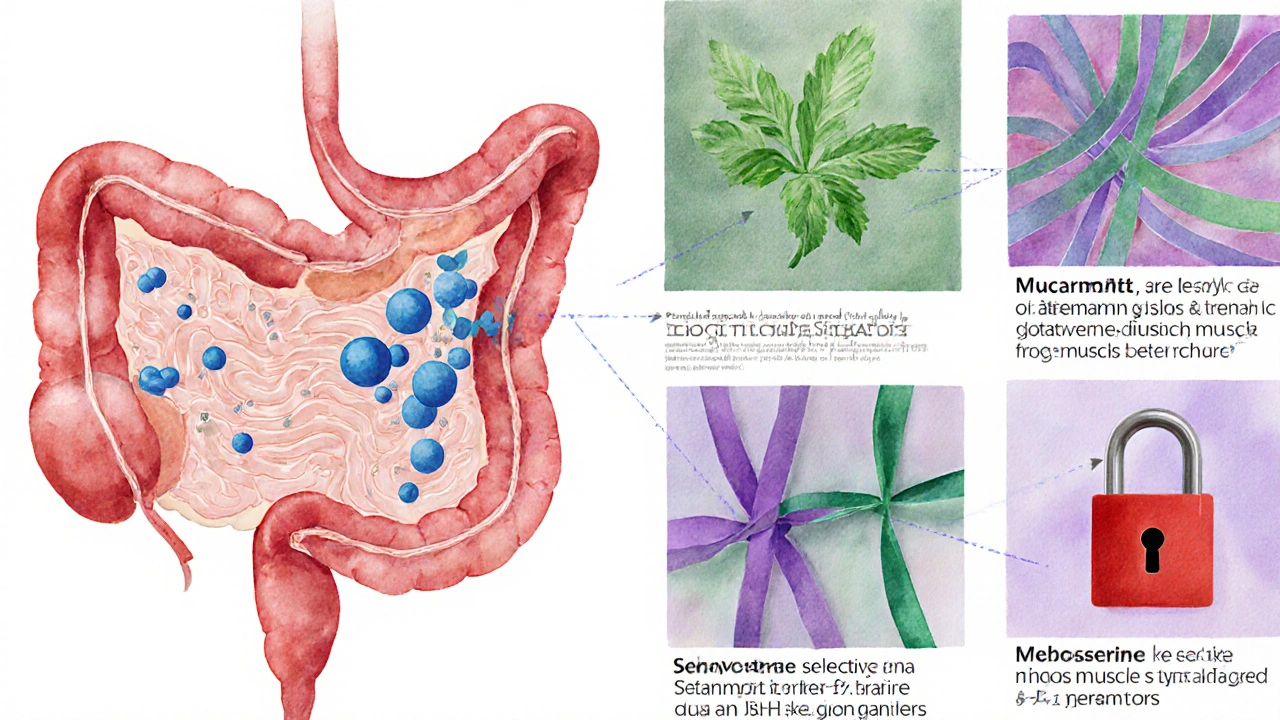
Comparison Table
| Medication | Mechanism | Typical Dose | Onset (hrs) | Common Side‑effects | Prescription? | Average Monthly Cost (GBP) |
|---|---|---|---|---|---|---|
| Bentyl (dicyclomine) | Anticholinergic - blocks muscarinic receptors | 20mg TID | 0.5‑1 | Dry mouth, dizziness, blurred vision | Prescription | ~£12 |
| Buscopan (hyoscine butylbromide) | Peripheral antispasmodic - works locally in gut | 10mg up to 3×/day | 0.25‑0.5 | Minimal; occasional constipation | OTC | ~£5 |
| Peppermint oil (enteric‑coated) | Calcium‑channel blocker - smooth‑muscle relaxation | 0.2mL (≈2 caps) TID | 0.5‑1 | Heartburn, mild nausea | OTC | ~£8 |
| Mebeverine | Selective smooth‑muscle relaxant | 135mg TID | 1‑2 | Headache, dry mouth (rare) | Prescription (OTC in UK) | ~£10 |
| Alosetron | 5‑HT₂ antagonism - reduces gut motility | 0.5mg BID | 2‑3 | Constipation, rare ischemic colitis | Prescription (REMS) | ~£150 |
| Eluxadoline | µ‑opioid agonist / δ‑opioid antagonist | 100mg BID | 1‑2 | Constipation, pancreatitis risk | Prescription | ~£200 |
| Lubiprostone | Cl‑C‑2 chloride channel activator | 8µg BID | 1‑2 | Nausea, headache, dehydration | Prescription | ~£250 |
Decision‑Making Checklist
- Symptom pattern: Cramp‑dominant (Bentyl, Buscopan, Peppermint) vs diarrhoea‑dominant (Alosetron, Eluxadoline) vs constipation‑dominant (Lubiprostone).
- Side‑effect tolerance: If you’re sensitive to dry mouth, avoid Bentyl. If you have heartburn, be cautious with peppermint oil.
- Prescription vs OTC: OTC options are cheaper and easier to start, but may be less potent for severe cases.
- Cost considerations: Bentyl sits in the low‑to‑mid price range; newer agents can exceed £150/month.
- Regulatory status: Some drugs (Alosetron, Eluxadoline) require specialist monitoring.
Practical Tips & Common Pitfalls
1. Start low, go slow. Begin with the lowest effective dose of any new medication and titrate upward only if needed.
2. Watch for drug interactions. Bentyl, for example, can enhance the effects of other anticholinergics (e.g., antihistamines).
3. Don’t mix anticholinergics. Combining Bentyl with Buscopan rarely adds benefit but can increase side‑effects.
4. Consider timing with meals. Most antispasmodics work best when taken 30 minutes before food.
5. Track symptoms. Use a simple diary (pain score, stool frequency, side‑effects) to compare how each agent works for you.
When to See a Professional
If you experience any of the following, stop the medication and contact your GP or a gastroenterology specialist:
- Severe constipation or inability to pass gas (possible sign of obstruction)
- Unexplained weight loss or blood in stool
- Signs of allergic reaction - rash, swelling, difficulty breathing
- Persistent dizziness or fainting episodes while on anticholinergics
Bottom Line
There’s no one‑size‑fits‑all answer. Bentyl works well for many people with crampy IBS, but its systemic side‑effects push some toward gut‑focused agents like Buscopan or natural options such as peppermint oil. For severe diarrhoea‑type IBS, prescription‑only drugs like Alosetron or Eluxadoline may be the only viable route, albeit with higher cost and monitoring needs. Evaluate your symptom pattern, budget, and tolerance for side‑effects, then discuss the options with a healthcare professional to land on the best fit.

Frequently Asked Questions
Can I use Bentyl and Buscopan together?
Generally it’s not recommended. Both act as antispasmodics, and combining them can increase the risk of dry mouth, constipation, or blurred vision without offering extra pain relief. Talk to your doctor before mixing.
Is peppermint oil safe for long‑term use?
Enteric‑coated peppermint oil is considered safe for most adults when taken as directed (up to three doses a day). People with severe GERD should be cautious because menthol can relax the lower oesophageal sphincter and worsen heartburn.
Why is Alosetron only for women?
Clinical trials showed a higher risk of severe constipation and ischemic colitis in men, so the FDA limited its approval to women with severe IBS‑D who failed other treatments.
Do I need a prescription for Mebeverine in the UK?
Mebeverine is available over‑the‑counter in many UK pharmacies, but a prescription may be required for higher strengths or if you’re buying it online.
Which IBS drug is cheapest in the UK?
Buscopan (hyoscine butylbromide) is the most affordable OTC option, typically costing under £5 for a month’s supply. Bentyl and Mebeverine are a bit pricier, while newer prescription drugs can exceed £150 per month.
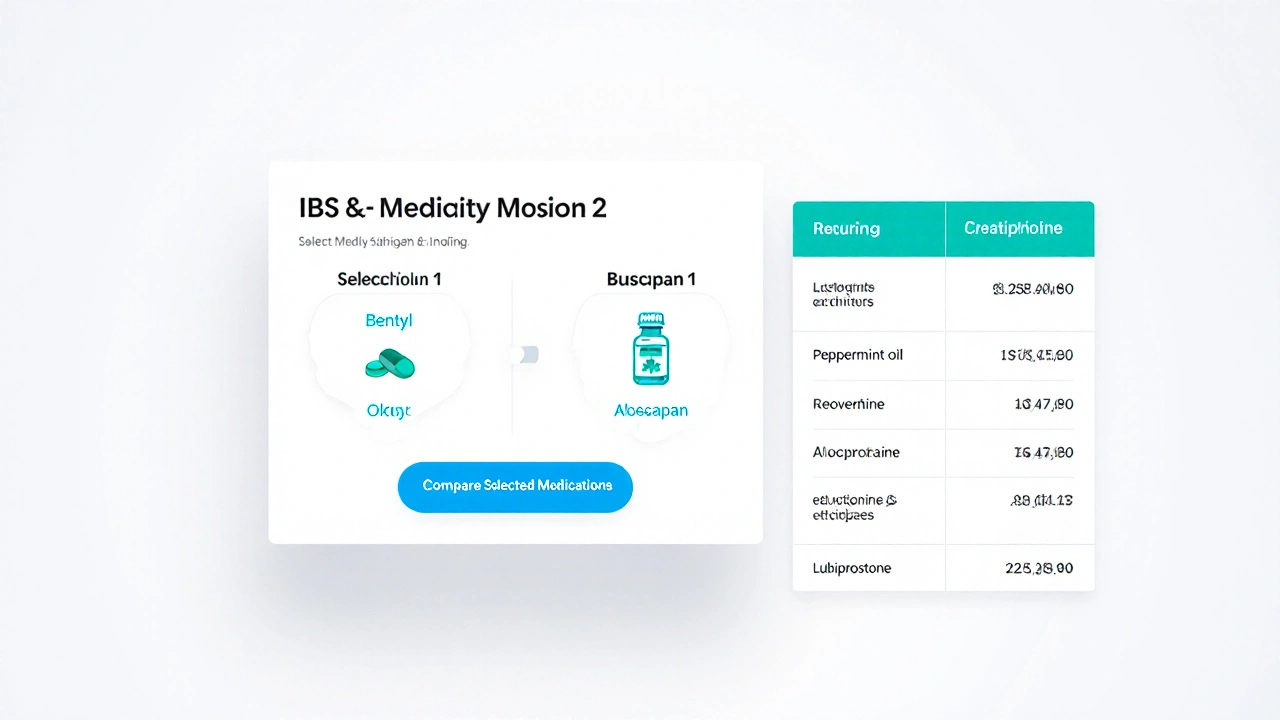

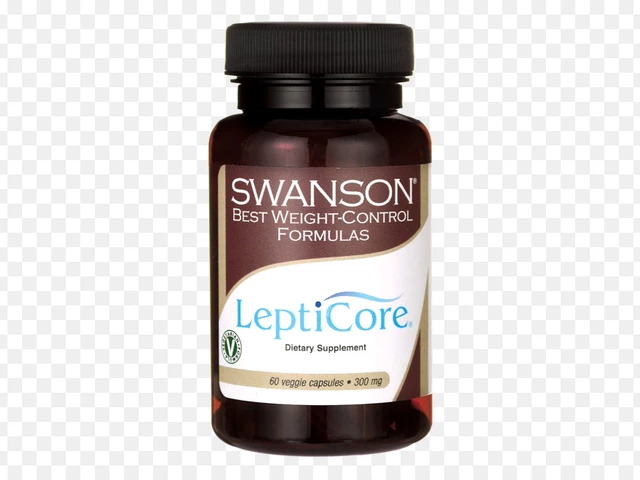
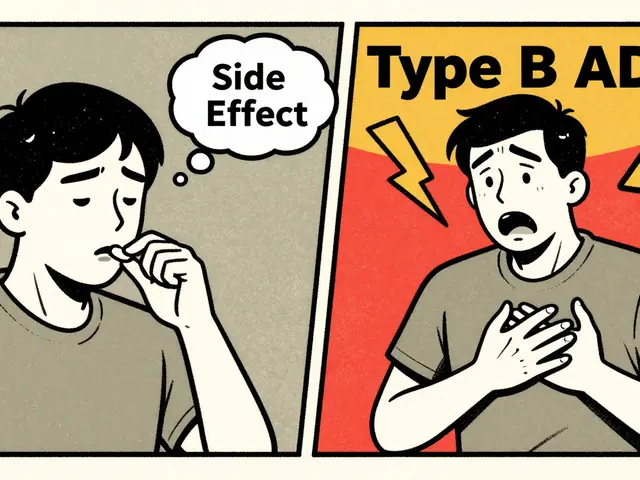

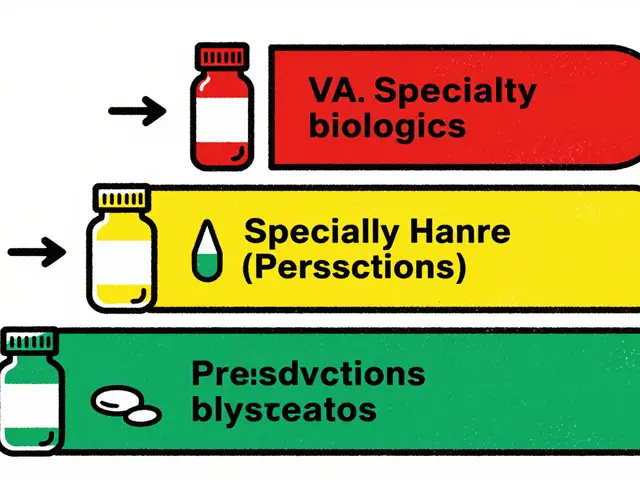
11 Comments
Michele Radford
October 1 2025Bentyl’s anticholinergic load is simply too aggressive for the average IBS patient, especially when milder options like Buscopan exist with a fraction of the systemic side‑effects. The dry mouth and blurred vision alone can degrade quality of life, making adherence a gamble. Moreover, prescribing a drug that crosses the blood‑brain barrier when an OTC peripheral antispasmodic does the job is ethically questionable. Health systems should push the cheaper, safer alternatives first.
Mangal DUTT Sharma
October 2 2025Honestly, I’ve been through the whole gamut of IBS meds and can attest that the personal trial‑and‑error journey is brutal 😩. Starting with a low‑dose Bentyl can feel like stepping onto a roller‑coaster; the anticholinergic effect hits within an hour and you might notice the classic dry‑mouth sensation, which some people actually tolerate for the relief it brings. If you’re prone to dizziness, I recommend pairing the first few days with plenty of water and a sugar‑free gum to keep saliva flowing, it’s a simple hack that eases the discomfort.
For those who prefer a gut‑targeted approach, Buscopan’s peripheral action means you get the cramp relief without the central nervous system fog, and it’s affordable enough to try multiple courses.
Enteric‑coated peppermint oil is another great stepping‑stone; the menthol releases directly in the small intestine, relaxing the smooth muscle via calcium‑channel blockade while sparing you from the classic anticholinergic side‑effects.
When I switched to peppermint after a month on Bentyl, my heartburn episodes actually decreased, which surprised me because the literature often warns about that risk.
In the long run, keep a symptom diary – note pain scores, stool consistency, and any side‑effects – this data becomes priceless when you discuss options with your GP.
Remember, the onset time matters: Bentyl kicks in 0.5‑1 hour, Buscopan even faster at 0.25‑0.5 hour, and peppermint sits somewhere in‑between. If you need rapid relief before a meeting, Buscopan might be the tactical choice.
Cost‑wise, Bentyl sits around £12/month while Buscopan is under £5, so insurance coverage or prescription benefits can tilt the decision.
Finally, never mix multiple antispasmodics without medical guidance – the cumulative anticholinergic burden can become dangerous, especially for older adults.
Stay patient, stay hydrated, and trust that an optimal regimen exists for you.
Gracee Taylor
October 3 2025Finding the right IBS therapy is often a balancing act between efficacy and tolerability. If you’re dealing primarily with cramp‑dominant symptoms, starting with a gut‑focused agent like Buscopan can give quick relief without the dry mouth that Bentyl brings. For those who can handle a mild drop in saliva, Bentyl remains a solid choice, especially when the cramp intensity is high. Ultimately, tracking how each drug impacts your daily life will guide the best decision.
Leslie Woods
October 4 2025Buscopan feels like a low‑key hero for sudden gut spasms.
Manish Singh
October 5 2025I totally get why people love that quick kick from Buscopan it works fast and you dont feel that dry mouth thing i have tried Bentyl before and it was a bit rough on my throat especially when i didnt drink enough water also keeping a log of your symptoms helps see if the relief is worth any side effects. Try starting with the lowest dose and see how your body reacts it can save you a bunch of hassle later on.
Dipak Pawar
October 6 2025From a pharmacodynamic perspective, the nuanced interplay between muscarinic antagonism and peripheral antispasmodic mechanisms warrants a stratified therapeutic algorithm. Bentyl’s systemic anticholinergic profile exerts a broad‑spectrum reduction in gastrointestinal smooth‑muscle excitability, yet this incurs collateral inhibition of salivary secretions, ocular accommodation, and cardiac vagal tone, which may be suboptimal for patients with comorbid autonomic dysfunction. In contrast, Buscopan’s quaternary ammonium structure restricts its bioavailability to the gastrointestinal lumen, delivering a localized antispasmodic effect via inhibition of calcium influx in enteric smooth muscle cells, thereby minimizing central adverse events.
Clinical trials have demonstrated a statistically significant faster onset of symptom amelioration with Buscopan (median 15 minutes) compared to Bentyl (median 30‑45 minutes), translating to superior patient satisfaction scores in acute flare‑ups.
Economically, the cost differential (~£5 vs £12 per month) aligns with health‑system formulary preferences, especially when generic manufacturers dominate the buscopan market.
Nonetheless, for refractory cases where visceral hypersensitivity is pronounced, the higher receptor occupancy achieved by Bentyl may confer incremental benefit, justifying its prescription in a step‑up approach after OTC failure.
Therefore, a tiered regimen-initial OTC buscopan followed by escalation to Bentyl upon inadequate response-optimizes both therapeutic efficacy and resource stewardship.
Jonathan Alvarenga
October 7 2025Honestly, most of these medication charts just look like marketing fluff that pretends every drug is a miracle. Bentyl’s side‑effects are listed like a menu of inconveniences, yet we’re expected to swallow them because the “efficacy” numbers are slightly better than Buscopan’s. The reality is, if you’re not willing to deal with dry mouth and dizziness, you’re probably not going to stick with it long enough to see any benefit. And let’s not forget the cost-£12 a month for a drug that makes you feel like you’ve got cotton in your mouth is hardly a bargain when a cheap OTC option exists. Bottom line: don’t be fooled by the fancy tables; pick what works for you without the hype.
Jim McDermott
October 8 2025One practical tip that’s often overlooked is timing your dose with meals. Taking Bentyl about 30 minutes before food can improve its absorption and reduce stomach upset. If you opt for Buscopan, you can actually take it any time because it works locally, which is handy for sudden cramps during the day. For peppermint oil, consistency is key; you’ll see the best results after a couple of weeks of regular use. And always keep a simple log-pain level, stool pattern, and any side‑effects-to help your doctor fine‑tune the regimen.
Naomi Ho
October 9 2025Bentyl works best when taken three times a day before meals to control cramp cycles. Buscopan provides fast relief and can be used as needed, making it ideal for breakthrough pain. Keep track of any dry‑mouth symptoms and hydrate often to mitigate discomfort.
Christine Watson
October 10 2025Hey everyone! It’s great to see so many helpful tips floating around. Remember, there’s no shame in trial‑and‑error-finding the perfect IBS match takes patience. Celebrate the small wins, like a day with fewer cramps, and keep a positive outlook. You’ve got this!
Macy Weaver
October 11 2025I appreciate all the perspectives shared here and just wanted to add that personal comfort with a medication is just as important as clinical efficacy. If a drug makes you feel uneasy, even if it “works”, it’s worth discussing alternatives with your clinician.